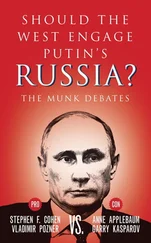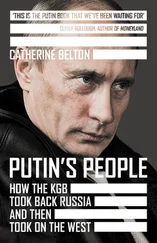America from time to time is troubled by the prospect of decline. But for all-or-nothing Russia decline is not an issue. Its very existence is always at stake. It is the default position of the Russian mind. A former legislator, Vladimir Ryzhkov, says: “Under Putin’s police state we are headed for another Time of Troubles in the best case scenario, if not a total collapse of the Russian state.” [192] Vladimir Ryzhkov, “Guriev Is Latest Victim of Putin’s Police State,” Moscow Times , June 4, 2013.
A museum director says that unless Russia creates a harmonious society within five generations “Russia will perish. Only the Duchy of Moscow will be left.” [193] Interview with Vladimir Grechukhin, “Pravda dlya nas vazhnee zakonov,” Argumenty I fakty , no. 38, 2007.
A columnist wonders—Will Russia survive until 2024?
Very prevalent today, the idea of Russia ceasing to exist is nothing new. In 1836 Peter Chaadayev published the first of his Philosophical Letters . Like a good Russian aristocrat, he wrote them in French, and later on they had to be translated into Russian. In those Philosophical Letters Chaadayev despaired of Russia, which he said belongs to neither Europe nor Asia. It neither partakes of the dynamic of those great civilizations nor possesses a dynamic of its own. “We belong to that number of nations which do not seem to make up an integral part of the human race, but which exist only to teach the world some great lesson. The lesson which we are destined to give will, naturally, not be lost; but who knows when we shall find ourselves once again in the midst of humanity, and what affliction we shall experience before we accomplish our destiny?” [194] Peter Chaadayev, Philosophical Letters (Knoxville: University of Tennessee Press, 1969), p. 38.
In a move that predated Soviet abuse of psychiatry by a century, Chaadayev was declared insane and forcibly placed under medical care, his papers seized.
A paradigm emerged from Chaadayev’s ideas. Cut off from the West by the Mongol conqueror and by obscurantist tsars, Russia had missed all the developmental stages of civilizational progress—Renaissance, Reformation, Counter-Reformation, Enlightenment. The lack of any developmental dynamic meant that progress came from above, from the omnipotent ruler, the tsar. It was a country held together by power, religion, and fear—in Chaadayev’s excellent phrase “a realm of brute fact and ceremony.” [195] Ibid.
Russia’s inherent shakiness was sensed not only by Russian philosophers, but by travelers to those parts in the nineteenth century. “Russia may well fall to pieces as many expect,” noted the dashing British intelligence officer Arthur Conolly, who often traveled through Central Asia in native guise, using the name Khan Ali, a pun on his own. [196] Arthur Conolly, Journey to the North of India 2 volumes, 1838. Also quoted in Philip Glazebrook, Journey to Khiva .
Not only is he credited with creating the term “great game,” he played it to the hilt until he was beheaded in Bukhara in 1842 at the age of thirty-four.
For the anti-regime intellectuals of the late nineteenth and early twentieth centuries, the destruction of Russia was something they not only sensed but actively desired. One of the major poets of that period, Alexander Blok, claimed he could actually hear the empire collapsing. Blok, who hailed the sinking of the Titanic in 1912 as proof that Nature was still mightier than man and his arrogant works, longed for an elemental revolution that would sweep away all the cant and rot, making a place for a new and better civilization to arise. Deeply disillusioned by the actual revolution that took place, he died in 1921, no longer able to hear history in the making because, as he said, “all sounds have stopped.” [197] Quoted in Avril Pyman, The Life of Alexander Blok (Oxford: Oxford University Press, 1979). Also quoted in Funeral Games in Honor of Arthur Lourie (New York: Oxford University Press, 2014), p. 12.
In Russia the sense of shaky enterprise, the tendency to build structures that collapse, is balanced by a genius for survival. A Russian hacker with the handle “Lightwatch” put it like this: “The Russians have a very amusing feature—they are able to get up from their knees, under any conditions, or under any circumstances.” [198] The hacker called “Lightwatch” quoted in Clifford Levy, “What’s Russian for Hacker?” New York Times , October 21, 2007.
Russia withstood and outlasted the invasions of Genghis Khan, Napoleon, Hitler. Russia survived its own tyrants from Ivan the Terrible to Joseph Stalin. It survived the implosion of its state structure during the Time of Troubles in the early 1600s, again in 1917, and yet again in 1991.
Those events have inspired great works of art—the opera Boris Godunov about the Time of Troubles, War and Peace about the invasion of Napoleon, Life and Fate about World War II. And those works of art have in turn inspired further acts of heroic survival by Russians, and have spread the fame of Russian fortitude throughout the world. It seems to have always been there. In the mid-900s the Arab traveler Ibn Miskawayh called them “a mighty nation … with great courage. They know not defeat, not does any of them turn his back until he slays or be slain.” [199] Ibn Miskawayh quoted in Richard Lourie, Predicting Russia’s Future (Whittle Direct Books, 1991), p. 8.
Even one of the American Mafia families took inspiration from Russia when going to war against the other families. As Salvatore “Sammy the Bull” Gravano, underboss to John Gotti, put it: “Fuck the battle. You learned that from the Russians. Yeah, they were dogs, they kept backing up. They let them Germans come right into their country. They made them freeze their asses off, run out of supplies, and then they destroyed them. So it’s not the battle, it’s the war.” [200] Peter Maas, Underboss (New York: HarperCollins, 1997), p. 25.
The principal Russian holiday is Easter, not Christmas. Of course, that is as it should be, because the rising of Christ from the dead is the central mystery and promise of Christianity. (How all that was reduced in the West to bonnets, bunnies, and eggs is a mystery in itself.) The Russians do not wish each other Happy Easter but exchange passionate affirmations: “Christ is risen!” “Truly He is risen!”
The myth of rebirth is central to the work of the Russian philosopher Nikolai Fyodorov (1829–1903). Said to be the only person in whose presence Count Leo Tolstoy ever felt humble, Fyodorov was an inspiration to Konstantin Tsiolkovsky, the father of Russian rocketry and thus of the Soviet space program. Fyodorov’s main idea was that Christianity and science were not at all at odds, but in fact were destined to work together for the greatest of all possible goals, the resurrection of everyone who had ever lived, the rescue of our ancestors from hated death.
The myth of rebirth also animates the Russian body politic at its moments of crisis. No invasion is too great not to be withstood and ultimately repelled, no collapse of the state from within can lead to permanent diminishment or ruination. What explains this? Is it the inbred hardiness of people who have endured centuries of harsh winter? Is it the cunning, also developed over centuries from dealing with the severities of invasion and tyranny? Is it simply a straightforward response to the straightforward Darwinian imperative: Do or Die? It is all of these, but there is also something else.
The source of Russia’s ability to overcome any trauma has been the cluster of values, images, and ideas that gave the nation its irreducible identity. But now there is a void at the core of the collective psyche. For the first time in its more than thousand-year history, Russia is without icons.
Читать дальше
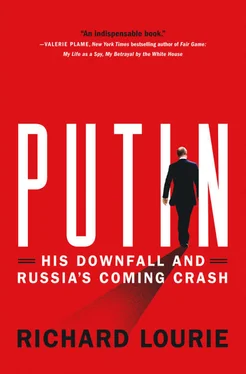

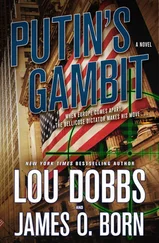
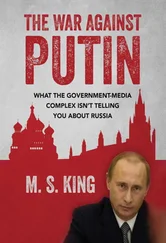

![Stephan Orth - Behind Putin's Curtain - Friendships and Misadventures Inside Russia [aka Couchsurfing in Russia]](/books/415210/stephan-orth-behind-putin-s-curtain-friendships-a-thumb.webp)

